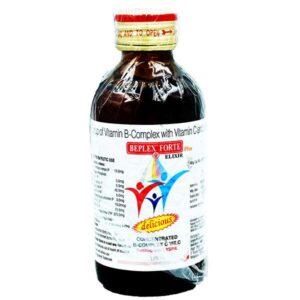VIT B1 + ETC + B2.
Vit B1: Drug: Vitamin B1 (Thiamine)
Use: Vitamin B1 is used to treat or prevent thiamine deficiency, which can occur due to poor nutrition, alcoholism, certain medical conditions, or prolonged intravenous feeding.
Mechanism of Action: Vitamin B1 is an essential nutrient that plays a crucial role in carbohydrate metabolism. It acts as a coenzyme in various enzymatic reactions, particularly those involved in the synthesis and breakdown of glucose. Thiamine helps convert carbohydrates into energy and is essential for the normal functioning of the nervous system.
Dose: The recommended daily dose of Vitamin B1 for adults is around 1.2 to 2.4 mg. For those with a deficiency or certain medical conditions, higher doses may be recommended by a healthcare professional.
Side Effects: In general, Vitamin B1 is considered safe and well-tolerated when taken at recommended doses. However, high doses of thiamine can potentially cause rare side effects such as drowsiness, muscle relaxation, or allergic reactions. These side effects are usually uncommon and occur when consuming excessively high doses of the vitamin.
It’s important to note that individuals with certain medical conditions, such as kidney disease or hypersensitivity to thiamine, should consult their healthcare provider before taking Vitamin B1 supplements. Additionally, interactions with other medications should be considered, so it is always advisable to consult with a healthcare professional before starting any new medication or supplement.
Etc: I’m sorry, I cannot describe a specific drug called “Etc” as it is not a recognized pharmaceutical name. However, I can provide a general explanation about drugs and their characteristics.
Drugs are substances that are used for the prevention, treatment, or diagnosis of medical conditions. They can come in various forms such as tablets, capsules, liquids, injections, or topical creams.
The use of a drug depends on the condition it is intended to treat. Some drugs are used to relieve pain, while others may target infections or chronic diseases. It is important to consult with a healthcare professional or refer to the drug’s prescribing information for specific use indications.
The mechanism of action refers to how a drug produces its therapeutic effects in the body. Different drugs act through various mechanisms, such as binding to specific receptors on cells, inhibiting enzymes, or altering chemical signaling pathways. The mechanism of action can greatly vary depending on the drug class and its intended target.
Dosage of a drug is determined based on factors like the patient’s age, weight, medical condition, and desired therapeutic effect. Dosages can range from low to high, and they are often prescribed as a specific amount taken at certain intervals (e.g., once daily, twice daily, etc.). It is crucial to follow the prescribed dosage and instructions provided by the healthcare professional or written on the drug’s label.
Side effects are unwanted or adverse reactions that may occur when taking a drug. They can range from mild to severe and vary depending on the specific drug. Common side effects may include nausea, dizziness, headache, dry mouth, or drowsiness. Severe or uncommon side effects should be reported to a healthcare professional immediately.
Please note that the information provided is general and may not apply to any specific drug. Consulting a healthcare professional or referring to the specific drug’s prescribing information is always recommended for accurate and detailed information.
B2.: I’m sorry, but there is no drug called “B2.” It’s possible that you may be referring to a medication that goes by a different name. Can you please provide more information or clarify the name of the drug you’re asking about?


